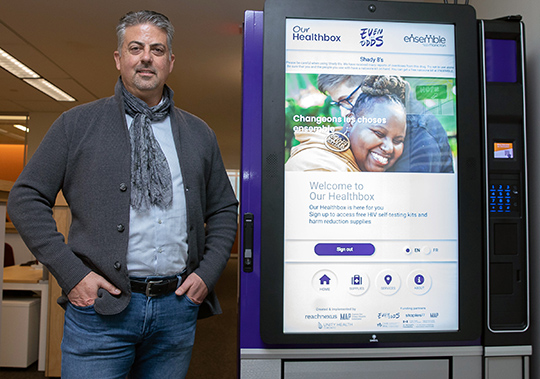Rapid tests take aim at HIV and syphilis in Canada

A research team is bringing new tools to the fight against HIV and syphilis amid a surge in new diagnoses in Canada.
REACH Nexus, a national research group located at the MAP Centre for Urban Health Solutions at St. Michael’s Hospital in Toronto, is implementing several groundbreaking public health interventions to help meet people where they are.
From bringing new sexually transmitted and blood-borne infection (STBBI) tests to market, to leading a national HIV self-testing program, to deploying smart vending machines that provide free health and wellness supplies, REACH Nexus is expanding low-barrier options for Canadians, connecting them to care providers, and helping to reduce rates of HIV, syphilis, and other STBBIs.
The number of new cases of HIV increased 35 percent from 2022 to 2023, with 2,434 diagnoses. In 2023, there were 12,135 cases of infectious syphilis and 53 cases of congenital syphilis, an increase of 77 percent and 220 percent, respectively, since 2018. Saskatchewan and Manitoba have the highest rates in the country. Congenital syphilis is transmitted during pregnancy or childbirth, and it can cause serious health problems—even death—for the baby.
It's estimated that more than 7,000 people are living with undiagnosed HIV in Canada. Many of them face barriers to testing such as living in rural or remote communities, having had negative experiences with the health care system, or encountering stigma or discrimination.
“To reach the undiagnosed with HIV and other blood borne and sexually transmitted infections, we need rapid point-of-care and self-tests that we can deploy in communities,” says Dr. Sean Rourke, Director of REACH Nexus and a scientist at the MAP Centre for Urban Health Solutions.
“Most people who are undiagnosed do not connect into the health care system in traditional ways— the system may have treated them badly, or it hasn't really worked for them. These tests give them the option to test at home or with someone they trust in the community.”
With funding from CIHR, REACH Nexus has conducted studies that helped four standalone and dual tests for HIV and syphilis obtain Health Canada approval. They include Canada’s first self-test for HIV approved in November 2020.
Through their clinical trials, they’ve reached about 7,000 people in Alberta and 2,000 in Saskatchewan, identifying 155 HIV cases and 446 active syphilis cases, including pregnant mothers—helping prevent congenital syphilis in several cases.
The support doesn’t stop with a test. If someone tests positive for HIV or syphilis, they are immediately connected to a health care provider and put on treatment. For HIV, treatment can bring the virus down to an undetectable level where it can’t be transmitted to another person. This is why it’s critical for people to know their HIV status.
Dr. Rourke and his team are also expanding access through innovative programs and community partnerships. One example is Our Healthbox: a vending machine that dispenses free HIV self-test kits, harm reduction supplies, and self-care products. In October 2025, Dr. Rourke participated in the launch of the program in the Piikani Nation in Alberta, which became one of 20 communities in which these high-tech health interventions are now available, including in the Northwest Territories. Healthboxes have reached more than 14,800 people, dispensing more than 80,000 health and wellness supplies, including over 3,700 naloxone kits, and over 1,700 HIV self-tests.
The team also recently launched The Ayaangwaamiziwin (an Ojibwe word for “carefulness and preparedness”) Centre, a ground-breaking initiative to test, treat and connect more than 11,500 people at risk for HIV or syphilis in the Prairies and the North with culturally safe care. The initiative has already tested over 1,500 people and has identified 61 cases of HIV and 175 cases of active syphilis.
Guided by a Two-Eyed Seeing approach, the Centre consists of organizations working together to provide access to testing, preventative care, harm reduction, treatment and care for HIV and syphilis in underserved and remote communities across the regions. It’s an example of how REACH Nexus seeks to transform and bridge the public health and community sectors to help the most vulnerable and marginalized communities in Canada.
For Dr. Rourke, the work is about more than infectious diseases, it's about health equity and treating everyone with the dignity and respect they deserve.
“Our research has real impact,” he says. “We're reaching people who if they didn't get tested and treated would die at a much earlier age or would have bad health for a good part of their life. We're changing health trajectories for many people, adding years to their lives and giving them the opportunity to have a better quality of life.”
At a glance
Issue
The rates of HIV and syphilis have surged in Canada in recent years. This rise has made it critically important to reach people who carry these infections but are undiagnosed.
Research
REACH Nexus, a national research program at the MAP Centre for Urban Health Solutions at St. Michael's Hospital in Toronto has conducted clinical studies supporting the authorization of four HIV and syphilis tests in Canada. The research team has also developed innovative programs and partnerships to provide low barrier options for people to be tested at home or in a trusted environment in their community.
- Date modified: